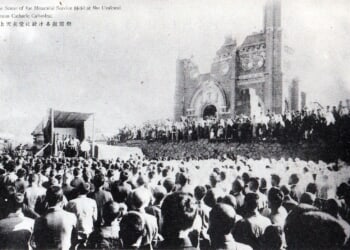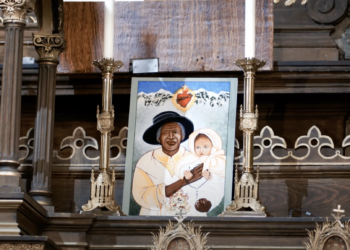Dr Freddie Attenborough is Director of Research for the Free Speech Union.
When police officers parade themselves around town in the colours of Pride, one of the basic principles of policing by consent goes missing: impartiality. That, in essence, was the conclusion of the UK High Court last week, which ruled that Northumbria Police acted unlawfully by allowing officers to take part in a Pride event. It won’t come as news to many people, but it is, nonetheless, a ruling with significant implications for free expression and the political neutrality of public institutions.
Free Speech Union member Linzi Smith brought the successful legal challenge, with support from the campaign group We Are Fair Cop. It centred on the force’s decision to let officers march in Newcastle’s 2024 Pride in the City parade and to staff a police stall draped in Progress flags, alongside a patrol van repainted in the same colours – all while visibly aligning themselves with the political messaging of the event.
At the heart of the dispute lay a now all-too-familiar tension: between policing impartiality and the apparently insatiable desire of public institutions to virtue signal while taking sides in ideological battles.
Linzi, a gender-critical lesbian, brought the claim after officers from Northumbria Police joined a Pride event organised by a group whose views on trans ideology directly oppose her own. Those views – that sex is real, binary and immutable – are protected under the Equality Act 2010 and Articles 9 and 10 of the European Convention on Human Rights.
For many who hold them, of course, the Progress flag is not a neutral banner signifying cuddly LGBTQ+ inclusion, but a political symbol. It represents the belief that gender identity, not biological sex, should determine how law and policy are made. As the judgment records, Northern Pride – the event’s organiser – doesn’t just campaign for that ideology, but has made clear that gender-critical people are not welcome at its marches.
So when uniformed police officers turned up, surrounded by Progress flags and official branding, the message conveyed could hardly be described as impartial. On the contrary, the force was signalling that it had taken a side in one of the most polarised cultural debates in Europe.
The problem isn’t just symbolic. When police forces publicly align themselves with an ideology, and then pursue or penalise those who reject it, public trust collapses. And gender-critical Brits now have every reason to doubt whether they will be treated fairly.
Women’s rights campaigner Jennifer Swayne was arrested by Gwent Police for putting up stickers that read ‘No men in women’s prisons’. South Wales Police removed lesbian activists from Pride Cymru for carrying signs that said ‘Lesbians don’t like penises’. Hampshire Police arrested army veteran Darren Brady for “causing anxiety” after he shared a meme mocking the Progress Pride flag. Sussex Police threatened to charge campaigner Kellie-Jay Keen with a hate-crime offence for expressing gender-critical views. Warwickshire Police recorded a non-crime hate incident against then Conservative MP Rachel Maclean after she tweeted critically about a trans politician and expressed support for sex-based rights.
It’s this backstory which gave the case against Northumbria Police its urgency.
Police officers are under a legal duty to act with impartiality – and to be seen to do so. That duty is set out in the Police Regulations 2003, the Police (Conduct) Regulations 2020, and the College of Policing’s Code of Ethics. Officers must not engage in activities that could compromise that impartiality, or even create the impression that they might.
In his judgment, Mr Justice Linden found that Chief Constable Vanessa Jardine had acted unlawfully by authorising officers to participate in the event. He ruled that the decision was not legally open to her, since “on any view” the force’s involvement was likely to give rise to the impression that officers might not act impartially in discharging their policing duties, particularly in cases involving protests or public speech about gender identity or women’s sex-based rights.
The judge emphasised that impartiality is not an optional aspiration but a core constitutional duty. One that applies to police officers at all times – whether on or off duty – and with particular force when they appear in uniform. He concluded that the Chief Constable’s reasoning was seriously flawed, and that her decision fell outside the range of lawful outcomes available to her.
Nor was that the only problem. The ruling also found a serious misreading of the Public Sector Equality Duty, as the statutory obligation on public authorities to have ‘due regard’ to the need to eliminate discrimination and advance equality. Instead of treating it as one part of a lawful decision-making process, the Chief Constable had allowed it to override everything else. She behaved, in effect, as if promoting Pride participation were a legal requirement in itself.
But as the court made clear, the Equality Act does not authorise otherwise unlawful conduct simply because it is pursued in the name of ‘inclusion’. The duty is to have due regard to certain equality aims, not to disregard other binding legal obligations.
Described by the court as raising “important, current, controversial and [matters] of public interest”, the case is expected to shape decision-making not only in Northumbria, but across police forces nationwide. Practices currently vary: some forces, such as the Police Service of Northern Ireland, prohibit uniformed Pride participation, while others, including Police Scotland and Merseyside, continue to allow it.
In the absence of national guidance, this ruling draws a line. It makes clear that the job of the police is not to march under activist banners, but to uphold the law – without fear, favour… or even a flag.



![Former Bravo Star Charged After Violent Assault Using a Rock-Filled Sock in Tennessee Walmart [WATCH]](https://www.right2024.com/wp-content/uploads/2025/07/Former-Bravo-Star-Charged-After-Violent-Assault-Using-a-Rock-Filled-350x250.jpg)



![Illegal Alien Walked Free After Decapitating Woman, Abusing Corpse for Weeks [WATCH]](https://www.right2024.com/wp-content/uploads/2025/07/1753013138_Illegal-Alien-Walked-Free-After-Decapitating-Woman-Abusing-Corpse-for-350x250.jpg)
![NYC Man Snatches Child Off The Sidewalk, Parents Chase Him Down [WATCH]](https://www.right2024.com/wp-content/uploads/2025/07/NYC-Man-Snatches-Child-Off-The-Sidewalk-Parents-Chase-Him-350x250.jpg)
![Man Arrested After Screaming at Senators During Big Beautiful Bill Debate [WATCH]](https://www.right2024.com/wp-content/uploads/2025/06/Man-Arrested-After-Screaming-at-Senators-During-Big-Beautiful-Bill-350x250.jpg)
![Karoline Leavitt Levels CNN's Kaitlan Collins and Other Legacy Media Reporters [WATCH]](https://www.right2024.com/wp-content/uploads/2025/07/Karoline-Leavitt-Levels-CNNs-Kaitlan-Collins-and-Other-Legacy-Media-350x250.jpg)






